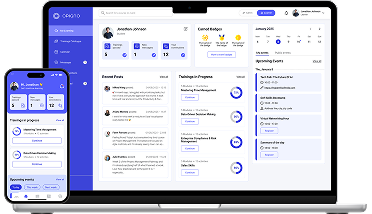In the world of luxury, excellence is an expectation and a necessity. From the meticulous craftsmanship to the customer-facing service, every interaction, product, and detail must reflect the brand's prestige. However, achieving this level of consistent excellence requires more than just a commitment to quality — it demands a strategic approach to training and development that overcomes the challenges setting luxury brands apart from other sectors.
Brand consistency across each touchpoint — in-store, online, or in communications — is paramount. And a global workforce means that training must transcend regional differences while upholding the same standards. The specialized skills of artisans and sales associates, key to maintaining luxury's charm, must be nurtured and honed. Finally, customer experience, defined by a tailored approach and attention to detail, requires employees to be exceptionally trained in product knowledge and service excellence.
Learning management systems are invaluable for providing structured, consistent interactive training, tracking compliance, and offering personalized learning paths across the brand's global operations — whether in a flagship store in Paris or a boutique in Tokyo.
Key use cases for an LMS in the luxury sector
Given how many aspects go into creating a top-notch experience and holding the bar high, it's no surprise that L&D for luxury brands must cover many different training directions across various job roles, departments, and stages of tenure. An LMS lets companies manage all these diverse training needs from one platform, regardless of the number, scale, or complexity of the brand's operations.
Here's how an LMS can effectively support the luxury sector across these multiple dimensions.
Building brand knowledge
Onboarding: An onboarding program ensures that new hires, from corporate offices to retail boutiques, get immersed in the brand ethos, history, values, and commitment to excellence. An LMS can deliver tailored onboarding paths based on role (corporate, retail, or manufacturing) with the most relevant content to each employee, ensuring they quickly align with the company culture.
Sales and customer service training: LMS platforms can equip staff with personalized, real-world scenarios and role-playing exercises to reinforce high-end market sales strategies, equipping employees with tools to manage VIP clients and provide exceptional service.
Product education: Luxury products are defined by their craftsmanship, materials, and heritage, making deep product knowledge essential. An LMS can offer detailed, interactive modules that allow staff to explore these elements through 3D models, video demonstrations, and even AR experiences.
Developing expertise and leadership
Artisans and craftsmanship training: When craftsmanship is the cornerstone of product quality, training must go beyond theory. LMS platforms can integrate hands-on training through video demonstrations, VR simulations, or assessments of artisanal techniques. Additionally, a mentorship component within the LMS could pair novice artisans with experienced masters to pass down crucial skills.
Leadership development: Leadership is essential to upholding the brand's standards and prestige. Customized leadership programs can nurture these traits, with the LMS offering a platform for executive coaching, succession planning, and even personalized leadership tracks based on an employee's career trajectory.
Ensuring consistency and compliance across borders
Compliance and ethical training: The luxury industry must navigate complex regulations related to ethical sourcing, anti-counterfeiting, corporate social responsibility (CSR), and sustainability. An LMS provides the necessary compliance training and certification management to ensure employees are aligned with local and global regulations.
Global training initiatives: As multinational luxury brands operate across regions with unique cultural and legal requirements, an LMS offers multilingual localization and region-specific training programs.
Luxury brands can leverage LMS platforms and their ability to support a multifaceted, multitenancy training ecosystem to maintain their heritage, foster employee expertise, and meet the evolving demands of a global luxury market.
What to look for in an LMS for a high-end brand training
To truly reap the benefits of an LMS, choosing a platform that's up to the task is crucial. So, when selecting an LMS, you'll want to ensure it's equipped with the right features and capabilities to get the most out of your investment and keep your brand's standards sky-high. Here's what to look for to ensure your LMS supports your brand's commitment to excellence:
Features
Multi-language support: A global brand's LMS should offer multi-language support to ensure everyone receives the training they need in their native language.
Mobile accessibility: Retail and manufacturing employees often don't have access to desktops. A seamless mobile experience keeps learning flexible and accessible anytime, anywhere.
Interactive content: Interactive elements like videos, quizzes, simulations, and even virtual showrooms are essential, especially when learning about intricate craftsmanship or customer service, letting employees virtually explore stores or workshops.
Blended learning capabilities: Complex training, like that for artisans or specialized roles, cannot do without in-person learning. An LMS should support the blended approach, combining digital modules with hands-on, in-person training for the most effective results.
Analytics and reporting: Detailed analytics help track learning progress and ensure employees meet the brand's high standards, while reporting is crucial for monitoring compliance, performance, and overall training effectiveness.
Social learning: Given the creative and collaborative nature of luxury brands, incorporating social learning tools like forums, peer reviews, and community spaces can enhance knowledge sharing and teamwork.
Personalized learning paths: The LMS should offer tailored learning journeys customized for the employee's function and skill level.
Customization
Branded interface: As a part of the ecosystem, an LMS should reflect the luxury brand's visual identity. Customizable interfaces integrating logos, colors, and brand values help maintain a cohesive, premium feel throughout the training experience.
Localization: Beyond translating content, the LMS should adapt to local legal and cultural differences like region-specific sales techniques and compliance requirements to keep training relevant and effective across different markets.
Integration with internal systems: Seamless integration with the brand's ecosystem, first of all - HR and CRM systems, is vital to a smooth workflow, automated onboarding, tracking employee progress, aligning training with the business goals, and streamlining operations overall.
Infrastructure
Cloud-based hosting: A cloud-based LMS provides global accessibility, ensuring employees from various locations can access training materials. Moreover, a reliable cloud service provider saves most of the platform's maintenance and upkeep worries.
Security: Given the sensitive nature of information in the luxury sector, like product details, client data, and intellectual property, the LMS must offer robust security features, including data encryption and privacy, strict access controls, and regular security audits.
Scalability: The LMS should scale effortlessly to accommodate thousands of users across different locations and departments. That's one more point for cloud-based LMS as it can adjust to the fluctuating demand.
These are the bare minimum required to run the training operations smoothly. However, with a skilled LMS development team, your luxury brand can go beyond the basics and create a training platform with custom-built features and integrations that fits your unique standards and operational demands like a glove. Here's an example of a renowned luxury brand that has advanced and scaled its corporate training for thousands of employees worldwide with a completely customized Opigno LMS:

Revamping Opigno into an encompassing gamified training platform
Learn how a renowned luxury brand advances and scales its corporate training for thousands of employees worldwide with a completely customized LMS.
Elevate your brand's legacy with Opigno
Luxury brands thrive on their ability to deliver a seamless blend of superior product quality, unmatched customer experiences, and a global brand image that speaks sophistication. An LMS plays a crucial role in maintaining these high standards by providing detailed product knowledge, preserving the brand's standards, and upholding the promise of luxury.
It's more than just a training tool; it's a strategic asset for luxury brands aiming to safeguard their heritage and shape a prosperous future. We offer a comprehensive cloud-based training platform along with custom development services to deliver a well-rounded experience tailored to your needs. Let's work together to elevate your brand's training and maintain your elite status — contact us today for a personal demo.
Published on September 17, 2024.
